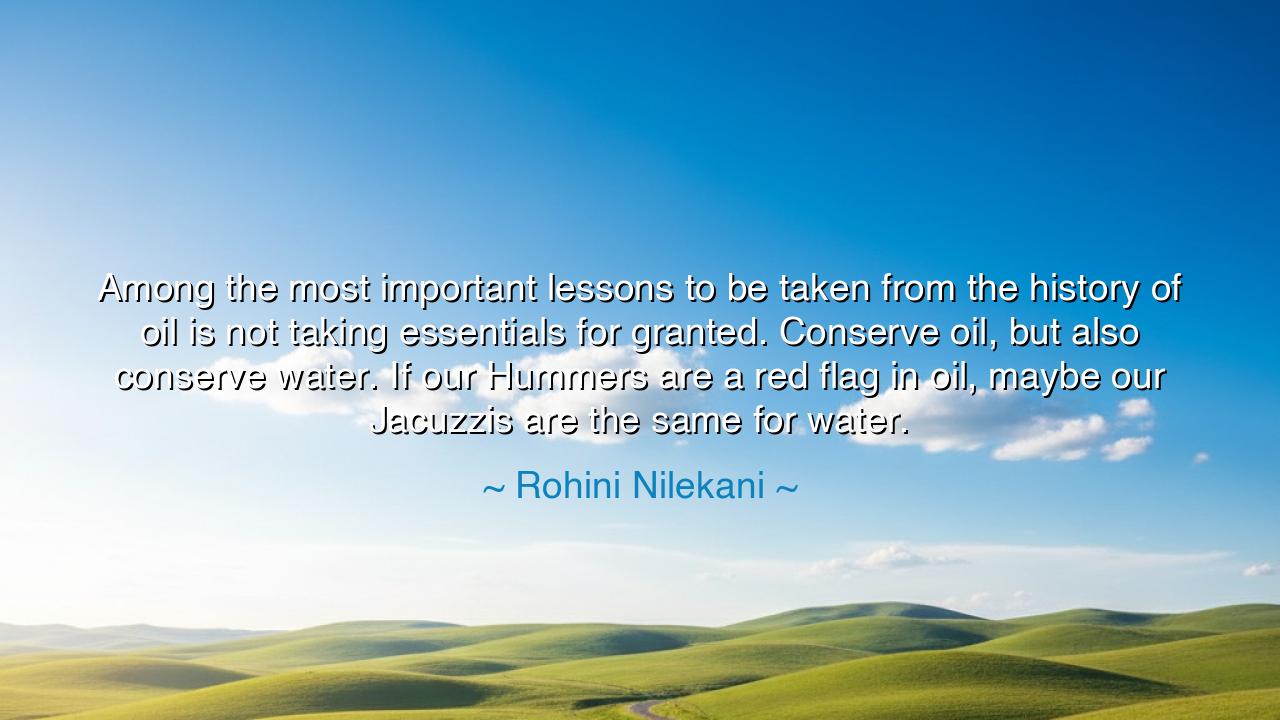
Among the most important lessons to be taken from the history of
Among the most important lessons to be taken from the history of oil is not taking essentials for granted. Conserve oil, but also conserve water. If our Hummers are a red flag in oil, maybe our Jacuzzis are the same for water.






The thinker and philanthropist Rohini Nilekani once said, “Among the most important lessons to be taken from the history of oil is not taking essentials for granted. Conserve oil, but also conserve water. If our Hummers are a red flag in oil, maybe our Jacuzzis are the same for water.” These words rise like a calm but stern wind from the depths of time, warning humanity of its recurring folly—the blindness of abundance. For Nilekani does not speak merely of oil or water, but of the human heart that grows careless when comfort becomes constant, and reckless when the earth’s patience seems infinite.
The history of oil is a parable written in flame. Once, it was the miracle that moved machines, the lifeblood of modern civilization. Yet, as nations drank deep of its bounty, the wells began to whisper warnings—of wars fought, of skies darkened, of oceans choked with the excess of our progress. Nilekani’s wisdom lies in seeing that what befell oil may soon befall water, the true essence of life itself. The thirst of nations is rising, yet we fill our Jacuzzis while rivers dry. We have learned nothing from the red flag of oil, and in our comfort, we walk toward a drought of the soul as much as of the soil.
In the ancient lands of Mesopotamia, where civilization was first born, rivers once carved abundance through the desert—the mighty Tigris and Euphrates. Yet, when the people forgot gratitude and drew greedily from their source, the waters turned against them. Salts rose in their fields, and their once-fertile earth grew barren. Thus fell the Sumerians, not by sword or plague, but by their own hand—by failing to honor the essentials. The same fate shadows us now, for every comfort we claim without reverence becomes a curse disguised as luxury.
When Nilekani speaks of Hummers and Jacuzzis, she invokes the symbols of excess. The Hummer, devourer of fuel, became the emblem of waste in the age of oil. The Jacuzzi, whispering luxury in a world of thirst, mirrors that same blindness in the age of water. Both are mirrors of our desires—how we turn necessity into indulgence, how we mistake consumption for success. But behind her words lies not condemnation, but awakening: the call to see the sacred in the simple, the divine in what sustains us daily.
To conserve is not to renounce joy; it is to remember gratitude. The ancients poured libations to rivers before drawing their waters, understanding that to take without thanks is to invite ruin. In every drop we waste lies the echo of forgotten reverence. When we bathe, let us remember the rain that feeds the fields; when we drive, let us recall the earth that bears the oil beneath. True civilization is not measured by what it consumes, but by what it preserves for those yet unborn.
The lesson, then, is simple yet profound: do not take essentials for granted. To the young who inherit this fragile planet—learn to see abundance as responsibility, not entitlement. Plant trees where the soil is weary; harvest rain before it falls to dust. Choose the bicycle over the engine, the bucket over the tub, the mindful over the mindless. For the world will not end in a sudden storm, but in a slow forgetting—when we no longer see wonder in water or grace in the ground.
Let every act of conservation become a quiet prayer of gratitude. Let us build cities that respect the rivers beneath them, industries that honor the wells they draw from, and hearts that know enough is wealth. For when we learn to guard our essentials, we guard not only the earth, but the very soul of humankind. Nilekani’s words, like the wisdom of the ancients, remind us: luxury fades, but life flows only where respect endures. To conserve is to love. To love is to endure. And those who endure will keep the world alive.






AAdministratorAdministrator
Welcome, honored guests. Please leave a comment, we will respond soon